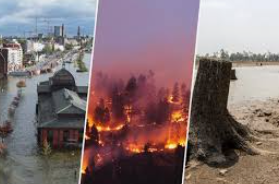The Perils of Ignoring Environmental Protection
The Earth, our shared home, is under threat.
The consequences of not protecting our planet are dire and far-reaching. If we fail to act, we risk altering the very fabric of the biosphere upon which all life depends.
The World Economic Forum warns that ecosystems are unraveling, and with them, the quality of life for all species will diminish. The services provided by nature, valued at an estimated $125 trillion per year, are at risk. These include clean air and water, crop pollination, and storm protection—essentials for human survival.
By 2030, it is imperative to protect twice as much land and four times as much ocean to maintain these critical ecosystems and avoid the most catastrophic effects of climate change. The future of life on our planet, including our own, hangs in the balance as humanity has overreached in its pursuit of affluence, altering more than 75% of the world’s ice-free land and using over half of the planet's habitable surface to produce food.
The Ideapod article paints a stark picture of the future if we continue on our current path. A rise in global temperature, already underway, could increase by an additional 1.5 degrees Celsius by 2050, leading to food shortages, uninhabitable areas, worsening air quality, extinction of species, economic impacts, risks to human life, and increased natural disasters. The loss of biodiversity is another grave concern. With the decimation of ecosystems, many species will struggle to survive, and many will go extinct, taking millions of years for Earth to recover its biodiversity. This loss is not just about wildlife; it affects humanity directly. As the United Nations reports, healthy, fertile lands are transforming into deserts, and thriving ecosystems into dead zones, with rising carbon dioxide emissions exacerbating the situation. The message is clear: protecting the environment is not optional; it is essential for the survival and prosperity of all life on Earth. The time to act is now, with concerted efforts to curb pollution, protect natural habitats, and mitigate climate change. The choices we make today will determine the legacy we leave for future generations. It is a responsibility we cannot afford to ignore.
Deforestation: A Global Concern with Far-reaching Impacts
Deforestation, the large-scale removal of forest cover, has significant implications for our planet, affecting everything from local ecosystems to global climate patterns. The impact of deforestation is multifaceted and deeply concerning, with consequences that extend far beyond the immediate area of tree loss.
Biodiversity Loss: Forests are complex ecosystems that are home to a vast array of species. The removal of forests leads to habitat destruction, which in turn can result in the loss of biodiversity. This loss is not just a concern for the species that call these forests home; it also affects human populations that rely on the diverse genetic pool for food, medicine, and other resources.
Carbon Cycle Alteration: Forests play a crucial role in the global carbon cycle by absorbing carbon dioxide from the atmosphere. When trees are cut down and burned or left to rot, the carbon stored in them is released back into the atmosphere, contributing to the greenhouse effect and climate change.
Water Cycle Disruption:
Trees are integral to the water cycle, helping to regulate the flow of water within an ecosystem. Deforestation disrupts this cycle, leading to changes in rainfall patterns and water availability. This can have dire consequences for agriculture, drinking water supplies, and the overall health of the ecosystem.
Soil Degradation:
Trees help to protect soil from erosion by wind and rain. Without this protection, deforested areas can quickly become barren and unable to support life. This soil degradation can lead to further environmental issues, such as landslides and the loss of fertile land for agriculture.
Climate Change Acceleration:
Deforestation is a significant driver of climate change. Forests act as carbon sinks, and their destruction contributes to the acceleration of global warming. This can lead to more extreme weather events, rising sea levels, and other climate-related challenges that affect all life on Earth.
Impact on Indigenous Communities: Many indigenous communities depend on forests for their livelihoods, culture, and way of life. Deforestation can displace these communities, leading to social upheaval and the loss of traditional knowledge and practices.
The rate of deforestation is alarming. According to the UN Food and Agriculture Organization, an estimated 10 million hectares of forest are cut down each year. This rate of loss has profound implications for the future of our planet.
To mitigate the impacts of deforestation, it is essential to promote sustainable land management practices, enforce laws that protect forests, and support reforestation efforts. Additionally, raising awareness about the importance of forests and the consequences of their loss is crucial in driving change and ensuring a healthier planet for future generations.
The challenge of deforestation is immense, but it is not insurmountable. With concerted global efforts and a commitment to preserving our natural world, we can address this critical issue and safeguard the Earth's forests for the benefit of all. The time to act is now, before the damage becomes irreversible. Let us come together to protect and restore the lungs of our planet.



